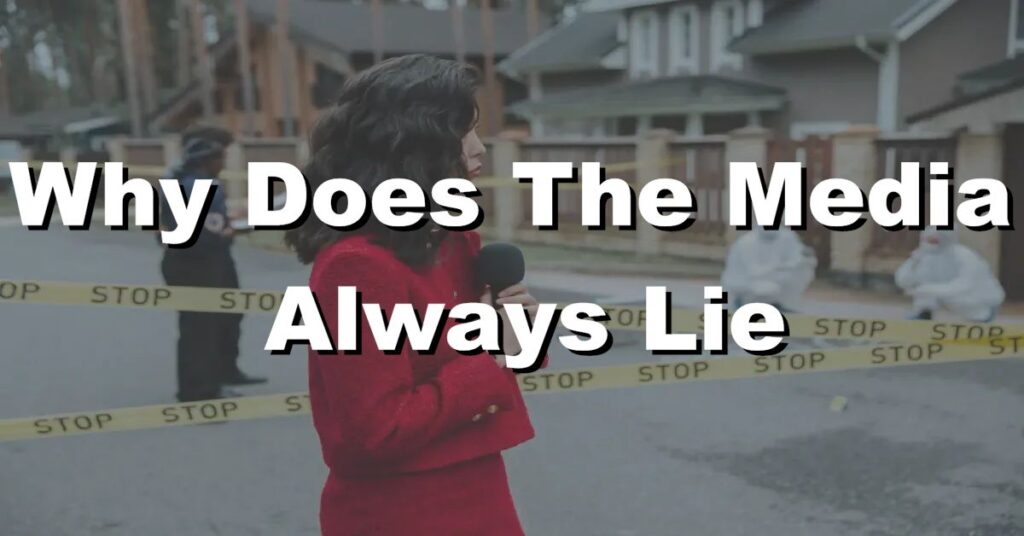The media has been accused of spreading lies and misinformation for decades. The reasons behind this are complex and multifaceted, ranging from personal biases to systemic issues within the media industry. In this article, we will explore some of the main reasons why the media sometimes fails to tell the truth and how this affects our society.
Common reasons for media dishonesty
Media dishonesty can stem from various factors, and it is essential to understand the common reasons behind it. One significant reason is sensationalism, where media outlets prioritize attention-grabbing headlines and stories to attract viewership or readership. Sensationalism often leads to exaggeration, distortion, or selective reporting of facts to create a more compelling narrative.
Another reason for media dishonesty is political bias. Media outlets may lean towards specific ideologies or political affiliations, resulting in biased reporting. This bias can manifest in various ways, such as cherry-picking evidence, manipulating images or videos, or presenting information in a way that supports a particular agenda.
Commercial interests can also drive media dishonesty. In pursuit of higher profits, some media organizations may prioritize advertisers or sponsors over journalistic integrity. This conflict of interest can lead to biased reporting or the suppression of stories that may harm business relationships.
Examples of media bias and fabrication
There have been several instances where media bias and fabrication have come to light. One example is the reporting of the Iraq War in 2003. Some media outlets presented misleading information about weapons of mass destruction, which played a significant role in shaping public opinion and support for the war.
Another example is the case of Jayson Blair, a former journalist for The New York Times, who fabricated stories and plagiarized content. This scandal exposed the lack of editorial oversight and integrity within the organization, leading to questions about the credibility of their reporting.
The impact of media lies on society
The impact of media lies on society is far-reaching. False or misleading information can shape public opinion, influence elections, and perpetuate stereotypes or prejudices. It erodes trust in the media as a reliable source of information and undermines the democratic process.
Media lies can also have real-world consequences. In some cases, misinformation or fabricated stories have incited violence, fueled social unrest, or harmed innocent individuals. The dissemination of false information can create division within society and hinder progress on important issues.
How to spot and avoid fake news
Spotting and avoiding fake news is crucial in today’s media landscape. To identify fake news, it is important to verify information from multiple reliable sources. Look for trusted news outlets with a reputation for unbiased reporting and fact-checking. Cross-referencing information and checking for corroborating evidence can help separate fact from fiction.
Be skeptical of sensational headlines or stories that evoke strong emotions. Fake news often relies on clickbait tactics to attract attention. Additionally, check the credibility of the author or the publication, looking for credentials, expertise, and a history of accurate reporting.
Holding the media accountable for their actions
Holding the media accountable is vital to ensure journalistic integrity and restore public trust. Media organizations should have transparent editorial policies, fact-checking processes, and mechanisms for addressing complaints or inaccuracies.
Independent media watchdogs and regulatory bodies play a crucial role in monitoring media practices and holding them accountable for any breaches of ethics or standards.
As consumers of news, we have a responsibility to be critical and discerning. Engage in media literacy education to understand the tactics used in misinformation campaigns and learn how to evaluate sources. Share reliable information responsibly and be cautious about spreading unverified or sensational claims.
Conclusion
In conclusion, the media is an important part of our society, but unfortunately, it has a reputation for lying. It is true that some journalists may have their own agenda and may report only a certain side of the story.
However, it is important to remember that not all media outlets are the same, and not all journalists lie. By being informed and doing our own research, we can avoid being misled by false information.

